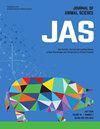PSII-30 探讨从油菜籽纤维中酶解释放的生物活性成分对肉鸡和断奶仔猪生长性能和肠道健康的益生潜力
IF 2.9
2区 农林科学
Q1 AGRICULTURE, DAIRY & ANIMAL SCIENCE
引用次数: 0
摘要
在我们的研究中,将油菜籽粕(CM)与特定的多种鸡尾酒碳水化合物酶和蛋白酶一起培养,以提高其纤维成分的生物活性。这一过程产生了酶改性菜籽粕溶渣(ECMS)产品,该产品是在对培养后的菜籽粕水溶性部分进行喷雾干燥后获得的。ECMS 的成分包括非淀粉多糖(NSP)水解产生的成分,如低分子量多糖和低聚糖,因此假设 ECMS 对单胃动物具有益生作用。与 CM 相比,ECMS 含有较多的粗蛋白、灰分和磷,较少的完整 NSP、中性洗涤纤维(NDF)、植酸磷、蔗糖、棉子糖和水苏糖。本研究旨在评估补充 ECMS 对肉鸡和断奶仔猪的生长性能、营养物质消化率、肠道功能和健康的影响。Ross 308 肉鸡被分配到三个日粮处理中,每个笼子 6 只鸡,每个处理 8 个重复。实验日粮包括玉米/豆粕对照日粮、含 1 克/千克 ECMS 的低 ECMS 日粮和含 20 克/千克 ECMS 的高 ECMS 日粮。结果表明,与低 ECMS 日粮和对照日粮相比,高 ECMS 日粮显著提高了采食量(FI)和体重(BW)。饲喂不同日粮的家禽在饲料转化率、回肠和盲肠消化液 pH 值、唾液酸分泌量以及 NDF 和氮的表观总消化率方面没有观察到明显差异。与对照组相比,饲喂高 ECMS 日粮的鸟类回肠和盲肠消化液中乳酸杆菌和肠球菌的含量明显更高。与对照组相比,饲喂 ECMS 日粮的禽类回肠消化液中短链脂肪酸 (SCFA) 总量明显增加。在随机完全区组设计中,将断奶仔猪(TN 70 × TN Tempo)随机分配到两种日粮处理中,共设 8 个重复栏。在 3 周内(断奶后 1 至 21 天),猪分别饲喂含 50 克/千克 CM 的玉米/豆粕对照组日粮和含 ECMS(替代 20 克/千克 CM)的实验组日粮。结果表明,实验日粮对生长性能没有显著影响。然而,ECMS 日粮降低了结肠内容物的 pH 值,增加了盲肠和结肠中的双歧杆菌数量(P < 0.05)。总之,ECMS 能明显调节肠道微生物群,增加回肠中 SCFA 的产生,提高肉鸡的生长性能。在断奶仔猪中,ECMS 显示出降低肠道 pH 值和刺激有益肠道微生物群增殖的能力。因此,在单胃动物营养中,ECMS 可被视为一种前景广阔的益生元。本文章由计算机程序翻译,如有差异,请以英文原文为准。
PSII-30 Exploring the prebiotic potential of enzymatically released bioactive components from canola fiber on growth performance and gut health of broiler chickens and weaned piglets
In our research, canola meal (CM) was incubated with a specific multi-carbohydrase cocktail and protease to enhance the bioactivity of its fiber components. This process resulted in the enzymatically modified canola meal solubles (ECMS) product, which was obtained following spray-drying of water-soluble fraction of the incubated CM. The ECMS was hypothesized to exhibit prebiotic effects in monogastric animals due to its composition, which includes components resulting from the hydrolysis of non-starch polysaccharides (NSP), such as low-molecular-weight polysaccharides and oligosaccharides. Compared with CM, ECMS contained more crude protein, ash, and phosphorus, and less intact NSP, neutral detergent fiber (NDF), phytate phosphorus, sucrose, and raffinose and stachyose. The objective of this study was to evaluate the effect of ECMS supplementation on the growth performance, nutrient digestibility, gut function and health of broiler chickens and weaned piglets. Ross 308 broiler chickens were assigned to three dietary treatments with 6 birds per cage and 8 replicates per treatment. The birds were raised under a controlled environment for 14 d. The experimental diets consisted of a corn/soybean meal Control diet, a Low ECMS diet containing 1g/kg of ECMS, and a High ECMS diet containing 20 g/kg of ECMS. The results indicated that the High ECMS diet led to a significant increase in feed intake (FI) and body weight (BW) gain compared with both the Low ECMS and the Control diets. No significant differences were observed in feed conversion ratio, pH of ileal and cecal digesta, sialic acids secretion, or apparent total tract digestibility of NDF and nitrogen between birds fed the different diets. Lactobacillus spp. and Enterococcus spp. were significantly more abundant in both the ileal and cecal digesta of birds fed the High ECMS diet compared with the Control diet. Total short-chain fatty acids (SCFA) in the ileal digesta of birds fed ECMS diets significantly increased compared with birds fed the Control diet. Weaned piglets (TN 70 × TN Tempo) were randomly assigned to two dietary treatments with 8 replicate pens in a randomized complete block design. Pigs were fed a corn/soybean meal Control diet containing 50 g/kg of CM and an experimental diet containing ECMS, replacing 20 g/kg of CM, for 3 wk (1 to 21 d post-weaning). The results showed that experimental diets had no significant impact on growth performance. However, the ECMS diet decreased the pH value of the colon contents and increased the population of Bifidobacterium in the cecum and colon (P < 0.05). In conclusion, ECMS significantly modulated gut microbiota, increased SCFA production in the ileum, and improved the growth performance of broilers. In weaned piglets, ECMS demonstrated the ability to decrease intestinal pH and stimulate the proliferation of beneficial gut microbiota. Therefore, ECMS could be considered a promising prebiotic in monogastric animal nutrition.
求助全文
通过发布文献求助,成功后即可免费获取论文全文。
去求助
来源期刊

Journal of animal science
农林科学-奶制品与动物科学
CiteScore
4.80
自引率
12.10%
发文量
1589
审稿时长
3 months
期刊介绍:
The Journal of Animal Science (JAS) is the premier journal for animal science and serves as the leading source of new knowledge and perspective in this area. JAS publishes more than 500 fully reviewed research articles, invited reviews, technical notes, and letters to the editor each year.
Articles published in JAS encompass a broad range of research topics in animal production and fundamental aspects of genetics, nutrition, physiology, and preparation and utilization of animal products. Articles typically report research with beef cattle, companion animals, goats, horses, pigs, and sheep; however, studies involving other farm animals, aquatic and wildlife species, and laboratory animal species that address fundamental questions related to livestock and companion animal biology will be considered for publication.
 求助内容:
求助内容: 应助结果提醒方式:
应助结果提醒方式:


